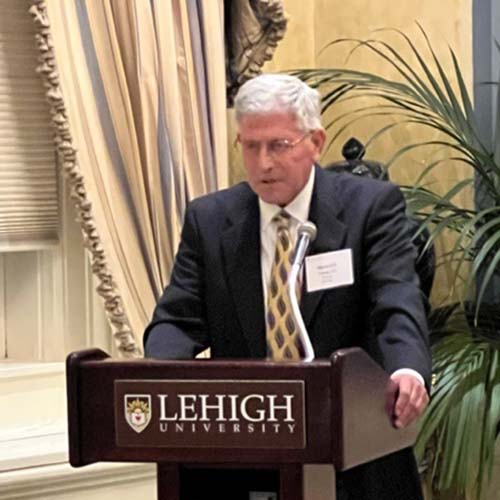Skepticism can be a healthy trait for any lawyer. But when Howard Polsky ’73 was informed that he was being honored as a distinguished alumnus in the field, he thought it was a prank that his Sigma Nu brothers put someone up to.
While such a stunt was not out of the realm of possibility, Polsky was delighted that the Lehigh Lawyers Association did in fact seek to honor him when it gathered for its annual spring awards dinner at the Penn Club in New York City.
O ver 30 lawyers and friends of Lehigh were in attendance to share a meal, raise a toast to Polsky, and network with an accomplished array of association members.
ver 30 lawyers and friends of Lehigh were in attendance to share a meal, raise a toast to Polsky, and network with an accomplished array of association members.
While Polsky has not been actively involved in the association, his accomplishments in practicing law for over 40 years are expansive. He earned his J.D. from Indiana University and then began a legal career that has spanned many sectors — public service, major law firms, and corporate general counsel positions.
He began his government service at the Federal Communications Commission and then became an associate in the D.C. office of Kirkland & Ellis, and then a partner at Wiley, Rein and Fielding, specializing in telecommunications law and regulation. After a decade, he moved in house to COMSAT Corporation, where he held executive-level legal and government relations roles. COMSAT was subsequently acquired by Lockheed Martin where Polsky served as general counsel of its Global Telecommunications business unit. Finally, he spent 15 years as general counsel of Stride, Inc. (formerly K12 Inc.), America’s largest provider of online education for K-12 students, a company he helped take public.
“There are so many memories that are part of my DNA. Lehigh is a special place."
“When I was an executive at COMSAT Corporation, Peter Likens, then president of Lehigh, sat on the COMSAT Board of Directors. Whenever I made a presentation to the board, I didn’t want to let him down,” he says.
Polsky never did. But rather than focus on his professional accomplishments as a leader and lawyer, he addressed his remarks at the event on his alma mater.
“There are so many memories that are part of my DNA,” says Polsky. “Lehigh is a special place. I can just walk around campus and get choked up.”
In his remarks, Polsky sought to distill what makes Lehigh so unique, and then how it had such a profound impact on his life and career.
Among other factors, he mentioned that Lehigh is a university that is “right-sized” to enable an individualized higher education experience. He noted that it is infused with traditions that bind us together as students and alumni; promotes close relationships with professors in a student’s major area of study; has had an interdisciplinary focus from its founding; and has a gorgeous campus, exceptional athletic fields, and a first-class performing arts center. He also mentioned its ability to attract true student-athletes that compete at the Division I level.
“Put it all together,” he said, “and the Lehigh culture is hard to duplicate anywhere else.”
Turning to his own experience, he came to campus as the first member of his family to attend college, and at a time when the Lehigh student body was all male. But rather than dive into freshman orientation, he was whisked away to the Poconos for a three-day band camp for members of the Marching 97.
“I played clarinet and had drills all day and rehearsal all night,” he says. Back then the band traveled with the football team, so he visited many rival stadiums. Due to its high-precision marching and constantly moving configurations, the band was invited to perform the halftime shows at several NFL games. “Pretty amazing for a school with only 3,200 students at the time.”
The government major also joined Sigma Nu, where he built leadership skills and a brotherhood with men who, to this day, hold mini-reunions. Polsky navigated the Vietnam War protests on campus and watched the draft on television as military officials drew numbers; he was relieved that his number fell just a few digits short, although several of his fraternity brothers were not as fortunate. Flowing out of the student protests, Polsky served on a new student governing body, then called The Forum. During his junior year, the University became co-educational, which “was a great part of the experience.”
“Graduates of other universities I have met in my career don’t have the same kind of feelings for their alma maters as I do for my alma mater,” he says. “I loved my time at Lehigh and the quality of the education and opportunities for personal growth. I enjoyed the full Division I experience, lining up for hours to get a ticket to a wrestling match. The curriculum was rigorous. The professors were fantastic — I was able to establish beneficial relationships with them. Every part of it was great for me.”
It’s what makes the Lehigh Lawyers Association award more special.
“I have had an amazing career and was pleasantly surprised and humbled by the recognition,” he says. “I was astonished at the number of Lehigh alums who traveled so far to attend this event.”
The award comes as Polsky is more deeply involved at Lehigh. He is a member of the dean’s advisory council for the College of Education and soon will serve as chair. Previously he served for six years on the dean’s advisory council for the College of Arts and Sciences. He also established an endowment in political science.